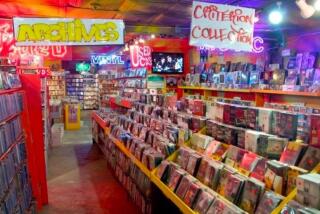George Atkinson, 69; Pioneer in the Movie Video Rental Industry
- Share via
George Atkinson, who opened the nation’s first video-rental store in West Los Angeles in 1977 and laid the foundation for what is now an $8-billion-a-year industry, has died. He was 69.
Atkinson died March 3 of complications from emphysema at his home in Northridge, said Betty Piscitello, his partner of 13 years.
Atkinson began renting videos out of his 600-square-foot Video Station store on Wilshire Boulevard in late 1977 and began selling franchises a year later. At its peak, Video Station Inc. had more than 550 affiliated stores across the United States and Canada.
“From Atkinson’s innovation, a tremendous industry has developed,” Bo Anderson, president of the Video Software Dealers Assn., said this week.
“He was the courageous first adopter of this as a business model and was aggressive about maintaining his rights under the law,” Anderson told the Los Angeles Times.
In the early years of movies on videocassettes, Anderson said, “the copyright owners did not want to permit the rental of movies, [but] the copyright law in the U.S. clearly permitted it. The result was that something that the copyright owners opposed grew into something that they loved, because they earn more than half of their total film entertainment revenues from home video.”
There now are more than 24,000 video stores in the United States, according to the Video Software Dealers Assn. Last year, those stores rented 2.6 billion DVDs and VHS cassettes, which generated more than $8 billion in revenue.
When the first consumer VCRs came on the market in 1975, Atkinson was the proprietor of Home Theater Systems, which he later dismissed as “a Mickey Mouse little business.” He was renting Super 8 movies and projectors for parties out of his Wilshire Boulevard storefront.
But when a new company called Magnetic Video began selling videocassette copies of pre-1973 20th Century Fox movies for $50 each in 1977, Atkinson got what he later called “a crazy idea.”
If people were willing to pay him $25 to rent a Super 8 movie for the night, he figured, why wouldn’t they pay a few dollars to rent a movie on videocassette?
To see if there was a market -- even though he had no movie videos to rent out at the time -- he ran an advertisement in The Times: “Video for Rent,” it said, inviting readers to fill out a coupon and mail it in.
In less than a week, “I had about a thousand coupons,” Atkinson told James Lardner, author of the 1987 book “Fast Forward: Hollywood, the Japanese and the VCR Wars.”
With the help of a $10,000 investment from a high school friend, Atkinson arranged to buy one Betamax and one VHS copy of all 50 available Fox titles -- including “MASH,” “Butch Cassidy and the Sundance Kid” and “The Sound of Music” -- at only $3 above the wholesale price.
Then he took out another advertisement in The Times -- a 1-inch-high, one-column-wide ad that quickly had his telephone “lighting up like Christmas.”
To raise capital for his newly dubbed Video Station store, Atkinson created a club for which he charged $50 for an annual membership and $100 for a lifetime membership, entitling members to rent movies for $10 a day.
Some of his first customers wanted to buy the videos rather than rent them, he told Lardner. They were “your Cadillac and Mercedes crowd who would take 10, 15, 20 movies at a crack,” Atkinson said. But he saw the long-term future of the business in rentals, not sales.
Studio executives didn’t think much of the rental idea, Atkinson recalled. “They said, ‘Americans are an acquisitive people. They want to own.’ ”
But Atkinson believed that movies would be the exception and envisioned a day when there would be thousands of movie titles available and VCR prices would come down “to match the pocketbook of the blue-collar guy, which would give us a whole new market.”
Responding to customer interest in getting into the videocassette business themselves, Atkinson decided to begin offering Video Station franchises in 1978.
The company eventually went public. But Atkinson resigned as president in 1983, after the board of directors issued a news release reporting that the firm had overstated its net worth by about $1 million at the end of fiscal 1982.
In 1988, Atkinson’s brother, Edward, who had been the company’s secretary-treasurer, was sentenced to five years in prison for perjury and securities fraud involving Video Station.
George Atkinson, who had pleaded guilty to filing false financial reports, was sentenced to three months in a community treatment center, five years’ probation and 2,000 hours of community service.
He was inducted into the Video Hall of Fame in 1991.
Born in Shanghai in 1935 to an English father and a Russian mother, Atkinson spent more than two years in a Japanese prison camp with his family during World War II. After the war, they lived in Canada before moving to Los Angeles.
Atkinson earned a degree in English literature from UCLA in 1958, then got bit parts in Hollywood, along with stand-in and stunt-double work.
Looking back on his heyday as the creator of the home video retail business in a 1999 interview with Video Store Magazine, Atkinson said: “My only regret is that I couldn’t patent it.”
The twice-divorced Atkinson is survived by three children, Maureen, Camille and Ashley; his mother, Valerie; and his brother, Edward.
More to Read
The biggest entertainment stories
Get our big stories about Hollywood, film, television, music, arts, culture and more right in your inbox as soon as they publish.
You may occasionally receive promotional content from the Los Angeles Times.









